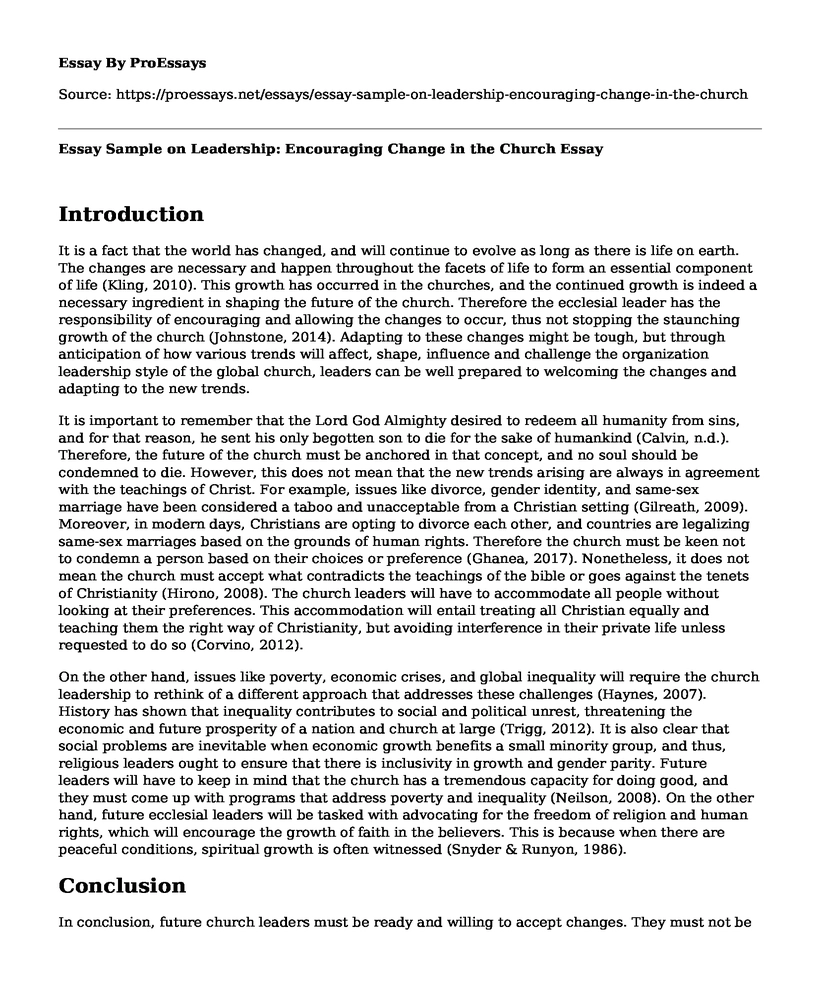Introduction
It is a fact that the world has changed, and will continue to evolve as long as there is life on earth. The changes are necessary and happen throughout the facets of life to form an essential component of life (Kling, 2010). This growth has occurred in the churches, and the continued growth is indeed a necessary ingredient in shaping the future of the church. Therefore the ecclesial leader has the responsibility of encouraging and allowing the changes to occur, thus not stopping the staunching growth of the church (Johnstone, 2014). Adapting to these changes might be tough, but through anticipation of how various trends will affect, shape, influence and challenge the organization leadership style of the global church, leaders can be well prepared to welcoming the changes and adapting to the new trends.
It is important to remember that the Lord God Almighty desired to redeem all humanity from sins, and for that reason, he sent his only begotten son to die for the sake of humankind (Calvin, n.d.). Therefore, the future of the church must be anchored in that concept, and no soul should be condemned to die. However, this does not mean that the new trends arising are always in agreement with the teachings of Christ. For example, issues like divorce, gender identity, and same-sex marriage have been considered a taboo and unacceptable from a Christian setting (Gilreath, 2009). Moreover, in modern days, Christians are opting to divorce each other, and countries are legalizing same-sex marriages based on the grounds of human rights. Therefore the church must be keen not to condemn a person based on their choices or preference (Ghanea, 2017). Nonetheless, it does not mean the church must accept what contradicts the teachings of the bible or goes against the tenets of Christianity (Hirono, 2008). The church leaders will have to accommodate all people without looking at their preferences. This accommodation will entail treating all Christian equally and teaching them the right way of Christianity, but avoiding interference in their private life unless requested to do so (Corvino, 2012).
On the other hand, issues like poverty, economic crises, and global inequality will require the church leadership to rethink of a different approach that addresses these challenges (Haynes, 2007). History has shown that inequality contributes to social and political unrest, threatening the economic and future prosperity of a nation and church at large (Trigg, 2012). It is also clear that social problems are inevitable when economic growth benefits a small minority group, and thus, religious leaders ought to ensure that there is inclusivity in growth and gender parity. Future leaders will have to keep in mind that the church has a tremendous capacity for doing good, and they must come up with programs that address poverty and inequality (Neilson, 2008). On the other hand, future ecclesial leaders will be tasked with advocating for the freedom of religion and human rights, which will encourage the growth of faith in the believers. This is because when there are peaceful conditions, spiritual growth is often witnessed (Snyder & Runyon, 1986).
Conclusion
In conclusion, future church leaders must be ready and willing to accept changes. They must not be static if the church is to survive the test of time. However, it does not mean that the church should accept every change, despite the contradiction. Instead, it means that leaders have a responsibility of bringing the people together and helping them mitigate through the crisis of life. This will entail financial empowerment, inclusivity, and recognition that everyone deserves religious freedom and dignity, for no one is righteous before the eyes of the Lord.
References
Calvin. (n.d.). Calvin, Children, and the Church. Calvin Today: Reformed Theology and the Future of the Church. doi:10.5040/9781472551122.ch-006
Corvino, J. (2012). The Case for Same-Sex Marriage. Debating Same-Sex Marriage, 4-90. doi:10.1093/acprof:osobl/9780199756322.003.0002
Ghanea, N. (2017). Religion, Equality, and Non-Discrimination. Religion and Equality Law, 95-108. doi:10.4324/9781315088945-6
Gilreath, S. (2009). Not a Moral Issue: Same-Sex Marriage and Religious Liberty. SSRN Electronic Journal. doi:10.2139/ssrn.1504170
Haynes, J. (2007). Economic Growth, Poverty, and Hunger. Religion and Development, 101-123. doi:10.1057/9780230589568_5
Hirono, M. (2008). Introduction: Christian "Civilizing Missions" of the Past and Present. Civilizing Missions, 1-18. doi:10.1057/9780230616493_1
Johnstone, P. (2014). The Future of the Global Church: History, Trends, and Possibilities. Downers Grove, IL: InterVarsity Press.
Kling, F. (2010). The Meeting of the Waters: 7 Global Currents That Will Propel the Future Church. David C Cook.
Neilson, R. L. (2008). Global Mormonism in the 21st century. Brigham Young University Religious Studies Center.
Snyder, H. A., & Runyon, D. V. (1986). Foresight: 10 major trends that will dramatically affect the future of Christians and the Church.
Trigg, R. (2012). The Foundations of Equality and Freedom. Equality, Freedom, and Religion, 139-152. doi:10.1093/acprof:osobl/9780199576852.003.0011
Cite this page
Essay Sample on Leadership: Encouraging Change in the Church. (2023, Jan 25). Retrieved from https://proessays.net/essays/essay-sample-on-leadership-encouraging-change-in-the-church
If you are the original author of this essay and no longer wish to have it published on the ProEssays website, please click below to request its removal:
- Developing Effective Consulting Skills on Example of Southwest Airlines Co
- Essay Sample on Democratic, Participative Leadership Style
- Essay on Theory-Based Risk Management: Conflict, Organizational Behavior & Vulnerability
- 3 Wisdom Subjects I Learned From Class Attendance - Essay Sample
- Essay on Confucianism in Understanding Virtue Ethics: Beyond Historical Labels
- Essay Example on Leadership Theory: Situational Leadership in Imagined Organisation
- Paper Example on Believing Women in Islam: Unread Patriarchal Readings of the Qur'an







